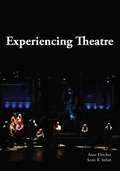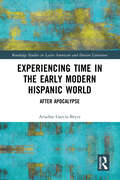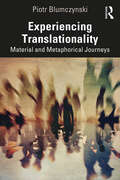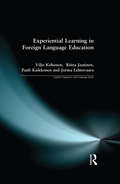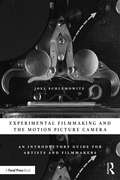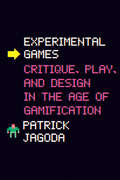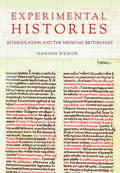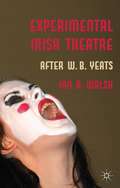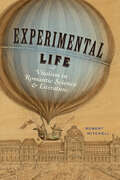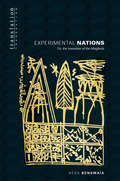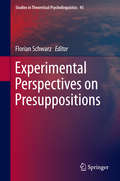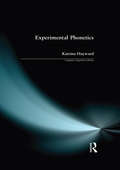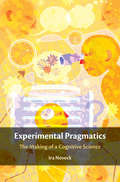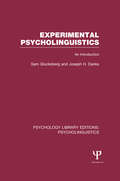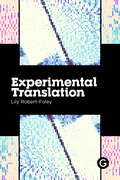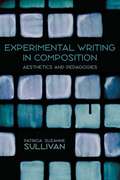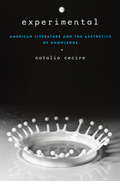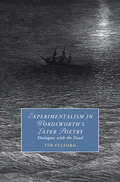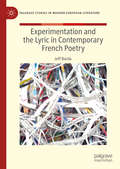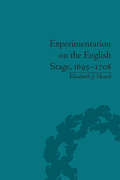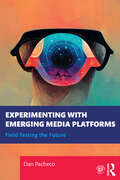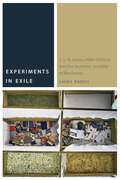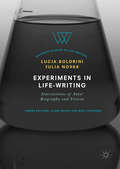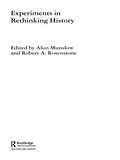- Table View
- List View
Experiencing Theatre
by Anne Fletcher Scott R. Irelan"Experiencing Theatre completely engages the beginning theatre student in the art of theatre. Students become playwrights, dramaturges, actors, directors, designers, adapters and collaborators though dynamic readings and excercises. This text gives them a great awareness of the work of being a theatre artist. Teachers have long strived towards creating these opportunities for their Intro students--finally a text that will make it happen." --Barbara Burgess-Lefebvre, Robert Morris University
Experiencing Time in the Early Modern Hispanic World: After Apocalypse (Routledge Studies in Latin American and Iberian Literature)
by Ariadna García-BryceThis book considers the new ways time was experienced in the 16th- and 17th-century Hispanic world in the framework of global Catholicism. It underscores the crucial role that the imitation of Christ plays in modeling how representative writers physically and mentally interiorize temporal impermanence as the Messiah’s suffering body becomes a paradigmatic as well as malleable marker of the avatars of earthly history. Particular attention is paid to the ways in which authors adapt Christ-centered conceptions of existence to accommodate both a volatile post-eschatological world and the increased dominance of mechanical clock time. As novel means of communing with Christ emerge, so too do new modes of sensing and understanding time, unleashing unprecedented cultural and literary reinvention. This is demonstrated through close analyses of writings by such influential figures as Saint Ignatius of Loyola, Saint Teresa of Ávila, Carlos de Sigüenza y Góngora, and Sor Juana Inés de la Cruz.
Experiencing Translationality: Material and Metaphorical Journeys
by Piotr BlumczynskiThis innovative book takes the concept of translation beyond its traditional boundaries, adding to the growing body of literature which challenges the idea of translation as a primarily linguistic transfer. To gain a fresh perspective on the work of translation in the complex processes of meaning-making across physical, social and cultural domains (conceptualized as translationality), Piotr Blumczynski revisits one of the earliest and most fundamental senses of translation: corporeal transfer. His study of translated religious officials and translated relics reframes our understanding of translation as a process creating a sense of connection with another time, place, object or person. He argues that a promise of translationality animates a broad spectrum of cultural, artistic and commercial endeavours: it is invoked, for example, in museum exhibitions, art galleries, celebrity endorsements, and the manufacturing of musical instruments. Translationality offers a way to reimagine the dynamic entanglements of matter and meaning, space and time, past and present. This book will be of interest to students and scholars in translation studies as well as related disciplines such as the history of religion, anthropology of art, and material culture.
Experiential Learning in Foreign Language Education (Applied Linguistics and Language Study)
by Viljo Kohonen Riitta Jaatinen Pauli Kaikkonen Jorma LehtovaaraThe goal of foreign language teaching is expanding from communicative competence towards an intercultural action competence. Essential in the new orientation is the shift towards a more balanced emphasis between the external factors in the learning environment and the personal capacity, conceptions, beliefs and assumptions inside the learner's mind. As part of the changes, assessment is seen as an important means of enhancing the elearning processes, emphasising the role of refelctive self-assessment. The text explores and integrates the necessary knowledge base and practices in foreign language education in terms of the basic concepts of experiential learning, intercultural learning, autobiographical knowledge and teacher development, together with the philosophical underpinnings of foreign language education.
Experimental Filmmaking and the Motion Picture Camera: An Introductory Guide for Artists and Filmmakers
by Joel SchlemowitzExperimental Filmmaking and the Motion Picture Camera is an introductory guide to experimental filmmaking, surveying the practical methods of experimental film production as well as the history, theory, and aesthetics of experimental approaches. Author Joel Schlemowitz explains the basic mechanism of the camera before going on to discuss slow and fast motion filming, single-frame time lapse, the long take, camera movement, workings of the lens, and the use of in-camera effects such as double exposure. A comprehensive guide to using the 16mm Bolex camera is provided. Strategies for making films edited in-camera are covered. A range of equipment beyond the basic non-sync camera is surveyed. The movie diary and film portrait are examined, along with the work of a range of experimental filmmakers including Stan Brakhage, Rudy Burckhardt, Paul Clipson, Christopher Harris, Peter Hutton, Takahiko Iimura, Marie Losier, Rose Lowder, Jonas Mekas, Marie Menken, Margaret Rorison, Guy Sherwin, and Tomonari Nishikawa. This is the ideal book for students interested in experimental and alternative modes of filmmaking. It provides invaluable insight into the history, methods, and concepts inherent to experimental uses of the camera, while providing students with a solid foundation of techniques and practices to foster their development as filmmakers. Supplemental material, including links to films cited in the book, can be found at www.experimentalfilmmaking.com.
Experimental Games: Critique, Play, and Design in the Age of Gamification
by Patrick JagodaIn our unprecedentedly networked world, games have come to occupy an important space in many of our everyday lives. Digital games alone engage an estimated 2.5 billion people worldwide as of 2020, and other forms of gaming, such as board games, role playing, escape rooms, and puzzles, command an ever-expanding audience. At the same time, “gamification”—the application of game mechanics to traditionally nongame spheres, such as personal health and fitness, shopping, habit tracking, and more—has imposed unprecedented levels of competition, repetition, and quantification on daily life. Drawing from his own experience as a game designer, Patrick Jagoda argues that games need not be synonymous with gamification. He studies experimental games that intervene in the neoliberal project from the inside out, examining a broad variety of mainstream and independent games, including StarCraft, Candy Crush Saga, Stardew Valley, Dys4ia, Braid, and Undertale. Beyond a diagnosis of gamification, Jagoda imagines ways that games can be experimental—not only in the sense of problem solving, but also the more nuanced notion of problem making that embraces the complexities of our digital present. The result is a game-changing book on the sociopolitical potential of this form of mass entertainment.
Experimental Histories: Interpolation and the Medieval British Past
by Hannah WeaverIn Experimental Histories, Hannah Weaver examines the medieval practice of interpolation—inserting material from one text into another—which is often categorized as being a problematic, inauthentic phenomenon akin to forgery and pseudepigraphy. Instead, Weaver promotes interpolation as the signature form of medieval British historiography and a vehicle of historical theory, arguing that some of the most novel concepts of time in medieval historiography can be found in these altered narratives of the past.For Weaver, historiographical interpolation constitutes the traces of active experimentation with how best to write history, particularly the history of Britain. Historians in twelfth- and thirteenth-century Britain recognized the difficulty of enfolding complex events into a linear chronology and embraced innovative textual methods of creating history. Focusing on the Brut tradition but also analyzing the long history of interpolated historiography, including the Bayeux Embroidery, Experimental Histories offers a new interpretation of generic remixing in medieval writing about the past. Drawing on both manuscript studies and the new formalism, it shows that the practice of inserting materials from romance and hagiography allowed creative revisers to explore how lived events relate to passing time. By embracing interpolation, Weaver provides lively insights into the ways that time becomes history and human actors experience time.
Experimental Irish Theatre
by Ian R. WalshThis book examines experimental Irish theatre that ran counter to the naturalistic 'peasant' drama that became synonymous with Irish playwriting. Focusing on four marginalised playwrights who premiered works after the death of W. B. Yeats, it charts an alternative tradition linking the experimentations of the early Irish theatre movement with the innovations of contemporary Irish and international drama. Drawing on archival material never before published this study rediscovers the vibrant and dissenting smaller theatre companies and playwrights of a forgotten era in Irish theatre. In its concentration on the margins and its emphasis on the performative rather than literary affects of the plays, this book offers a fresh alternative telling of the Irish theatrical story, important works are recovered and the breadth of the Irish canon is widened. This book will prove attractive and satisfying to students, theatregoers, and readers of theatre history, performance studies, modernism, and Irish studies.
Experimental Life: Vitalism in Romantic Science and Literature
by Robert MitchellExperimental Life establishes the multiple ways in which Romantic authors appropriated the notion of experimentation from the natural sciences.Winner of the Michelle Kendrick Memorial Book Prize of the Society for Literature, Science, and the Arts, BSLS Book Prize of the British Society for Literature and ScienceIf the objective of the Romantic movement was nothing less than to redefine the meaning of life itself, what role did experiments play in this movement? While earlier scholarship has established both the importance of science generally and vitalism specifically, with regard to Romanticism no study has investigated what it meant for artists to experiment and how those experiments related to their interest in the concept of life.Experimental Life draws on approaches and ideas from contemporary science studies, proposing the concept of experimental vitalism to show both how Romantic authors appropriated the concept of experimentation from the sciences and the impact of their appropriation on post-Romantic concepts of literature and art.Robert Mitchell navigates complex conceptual arenas such as network theory, gift exchange, paranoia, and biomedia and introduces new concepts, such as cryptogamia, chylopoietic discourse, trance-plantation, and the poetics of suspension. As a result, Experimental Life is a wide-ranging summation and extension of the current state of literary studies, the history of science, cultural critique, and theory.
Experimental Nations: Or, the Invention of the Maghreb (Translation/Transnation #4)
by Réda BensmaïaJean-Paul Sartre's famous question, "For whom do we write?" strikes close to home for francophone writers from the Maghreb. Do these writers address their compatriots, many of whom are illiterate or read no French, or a broader audience beyond Algeria, Morocco, and Tunisia? In Experimental Nations, Réda Bensmaïa argues powerfully against the tendency to view their works not as literary creations worth considering for their innovative style or language but as "ethnographic" texts and to appraise them only against the "French literary canon." He casts fresh light on the original literary strategies many such writers have deployed to reappropriate their cultural heritage and "reconfigure" their nations in the decades since colonialism. Tracing the move from the anticolonial, nationalist, and arabist literature of the early years to the relative cosmopolitanism and diversity of Maghrebi francophone literature today, Bensmaïa draws on contemporary literary and postcolonial theory to "deterritorialize" its study. Whether in Assia Djebar's novels and films, Abdelkebir Khatabi's prose poems or critical essays, or the novels of Nabile Farès, Abdelwahab Meddeb, or Mouloud Feraoun, he raises the veil that hides the intrinsic richness of these artists' works from the eyes of even an attentive audience. Bensmaïa shows us how such Maghrebi writers have opened their nations as territories to rediscover and stake out, to invent, while creating a new language. In presenting this masterful account of "virtual" but veritable nations, he sets forth a new and fertile topography for francophone literature.
Experimental Perspectives on Presuppositions
by Florian SchwarzThis volume brings together some of the most recent developments in the field of experimental pragmatics, specifically empirical approaches to theoretical issues in presupposition theory. It includes studies of the online processing of presupposed content; investigations of the interpretive properties of presuppositions in various linguistic contexts; comparative perspectives relative to other aspects of meaning, such as asserted content and implicatures; cross-linguistic comparisons of presupposition triggers; and perspectives from language acquisition. Taken together, these novel contributions provide a snapshot of state-of-the art developments in this area and will serve as a point of reference for numerous emerging avenues of future work. It makes for an ideal set of readings for advanced university courses on experimental studies of meaning and is a must-read for anyone interested in experimental research on meaning in natural language.
Experimental Phonetics: An Introduction (Longman Linguistics Library)
by Katrina HaywardFirst published in 2000. Routledge is an imprint of Taylor & Francis, an informa company.
Experimental Pragmatics: The Making of a Cognitive Science (Palgrave Studies In Pragmatics, Language And Cognition Ser.)
by Ira NoveckHow does a listener understand a sarcastic 'That was a wonderful speech' when the words point to a positive review? Why do students of introductory logic interpret 'Some cabs are yellow' as 'Not all cabs are yellow' when the meaning of 'some' is compatible with 'all'? Pragmatics aims to explain how listeners draw out a speaker's meaning from utterances, an astonishing feat when one considers that the words in a sentence hardly suffice for fully comprehending what the speaker intended. Given the nature of pragmatics, it is going to take the interdisciplinary firepower of many cognitive sciences - including philosophy, experimental psychology, linguistics and neuroscience - to fully appreciate this uniquely human ability. In this book, Ira Noveck, a leading pioneer in experimental pragmatics, engagingly walks the reader through the phenomena, the theoretical debates, the experiments as well as the historical development of this growing academic discipline.
Experimental Psycholinguistics: An Introduction (Psychology Library Editions: Psycholinguistics)
by Sam Glucksberg Joseph H. DanksHow is speech produced and understood in the context of everyday communication? First published in 1975, this book is considered one the best of the early books in this field. The task of psycholinguistics is to discover how people produce and comprehend speech. This encompasses virtually all aspects of psychology, including perceptual, conceptual, and social processes. The authors tried to capture the flavour of this approach to the psychology of language by describing the major contemporary issues, problems, and phenomena, of the time, being dealt with in laboratories and in field studies, and by trying to make sense of the data they had. Experimental Psycholinguistics: An Introduction does not try to deal exhaustively with any one issue in linguistics or in psychology. Rather it tries to integrate the authors’ knowledge of language and language behaviour so that someone entering the field has an intelligible framework with which to start.
Experimental Syntax and Island Effects
by Norbert Hornstein Jon SprouseThis volume brings together cutting-edge experimental research from leaders in the fields of linguistics and psycholinguistics to explore the nature of a phenomenon that has long been central to syntactic theory – 'island effects'. The chapters in this volume draw upon recent methodological advances in experimental methods in syntax, also known as 'experimental syntax', to investigate the underlying cognitive mechanisms that give rise to island effects. This volume presents a comprehensive empirical review of a contemporary debate in the field by including contributions from researchers representing a variety of points of view on the nature of island effects. This book is ideal for students and researchers interested in cutting-edge experimental techniques in linguistics, psycholinguistics and psychology.
Experimental Translation: The Work of Translation in the Age of Algorithmic Production (Practice as Research)
by Lily Robert-FoleyThe history and future of an alternative, oppositional translation practice.The threat of machine translation has given way to an alternative, experimental practice of translation that reflects upon and hijacks traditional paradigms. In much the same way that photography initiated a break in artistic practices with the threat of an absolute fidelity to the real, machine translation has paradoxically liberated human translators to err, to diverge, to tamper with the original, blurring creation and imitation with cyborg collage and appropriation. Seven chapters reimagine seven classic &“procedures&” of translation theory and pedagogy: borrowing, calque, literal translation, transposition, modulation, equivalence, and adaptation, updating them for the material political and poetic concerns of the contemporary era. Each chapter combines reflections from translation studies and experimental literature with practical guides, sets of experimental translation &“procedures&” to try at home or abroad, in the classroom, the laboratory, the garden, the dance hall, the city, the kitchen, the library, the shopping center, the supermarket, the train, the bus, the airplane, the post office, on the radio, on your phone, on your computer, and on the internet.
Experimental Writing in Composition: Aesthetics and Pedagogies
by Patricia Suzanne SullivanSullivan unpacks the work of major scholars in composition and rhetoric and their theories on aesthetics, particularly avant-gardism. She also relates the dialectics that shape these aesthetics and sheds new light on both the positive and negative aspects of experimental writing and its attempts to redefine the writing disciplines. Additionally, she shows how current debates over the value of multimedia texts echo earlier arguments that pitted experimental writing against traditional models. Sullivan further articulates the ways that multimedia is and isn’t changing composition pedagogies, and provides insights into resolving these tensions.
Experimental: American Literature and the Aesthetics of Knowledge (Hopkins Studies in Modernism)
by Natalia CecireA compelling revision of the history of experimental writing from Pound and Stein to Language poetry, disclosing its uses and its limits.In this bold new study of twentieth-century American writing and poetics, Natalia Cecire argues that experimental writing should be understood as a historical phenomenon before it is understood as a set of formal phenomena. This seems counterintuitive because, at its most basic level, experimental writing can be thought of as writing which breaks from established forms. Touching on figures who are not typically considered experimental, such as Stephen Crane, Jacob Riis, Busby Berkeley, Ursula K. Le Guin, and Gottlob Frege, Experimental offers a fresh look at authors who are often treated as constituting a center or an origin point of an experimental literary tradition in the United States, including Gertrude Stein, Ezra Pound, William Carlos Williams, and Marianne Moore. In responding to a crisis of legitimization in the production of knowledge, this tradition borrows and transforms the language of the sciences.Drawing upon terminology from the history of science, Cecire invokes the epistemic virtue, which tethers ethical values to the production of knowledge in order to organize diverse turn-of-the-century knowledge practices feeding into "experimental writing." Using these epistemic virtues as a structuring concept for the book's argument, Cecire demonstrates that experimental writing as we now understand it does not do experiments (as in follow a method) but rather performs epistemic virtues. Experimental texts embody the epistemic virtues of flash, objectivity, precision, and contact, associated respectively with population sciences, neuroanatomy, natural history and toolmaking, and anthropology. Yet which virtues take precedence may vary widely, as may the literary forms through which they manifest. Bringing it up to the 1980s, Cecire reveals the American experimental literary tradition as a concerted and largely successful rewriting of twentieth-century literary history. She shows how the Language poets, a group of primarily white experimental writers, restored to the canon what they saw as modernism's true legacy, whose stakes were simultaneously political and epistemological: it produced a poet who was an intellectual and a text that was experimental.
Experimentalism in Wordsworth's Later Poetry: Dialogues with the Dead (Cambridge Studies in Romanticism)
by Tim FulfordExperimentation and the Lyric in Contemporary French Poetry: Poetry On The Edge (Palgrave Studies in Modern European Literature)
by Jeff BardaExperimentation and the Lyric in Contemporary French Poetry offers a new theoretical approach and historical perspective on the remarkable upsurge in creative poetic practices in France that have challenged traditional definitions of poetry and of the lyric. Focusing on the work of Pierre Alferi, Olivier Cadiot, Emmanuel Hocquard, Franck Leibovici, Anne Portugal and Denis Roche, this book provides an analysis of the most influential poets in French poetry of the last few decades. It contextualizes the theoretical models that inform their investigations, analyzing them alongside the history of the avant-garde and the heated theoretical debates that have taken place over whether to continue or bring an end to the lyric. Systematically addressing the various strategies employed by these poets and drawing on reception theory and cognitive studies, Jeff Barda argues that French radical poetics re-evaluates the lyric in cognitive terms beyond the personal. This book is essential reading for anyone interested in twenty-first-century forms of experimental writing and the connections between literature and the arts today.
Experimentation on the English Stage, 1695-1708: The Career of George Farquhar
by Elisabeth J HeardAt the beginning of the eighteenth century, British theatre saw a shift from what critics call 'Restoration' to 'sentimental' comedy. Focusing on the career of the Irish dramatist George Farquhar (1678-1707), this book argues that experimentation was the basis for this change.
Experimenting with Emerging Media Platforms: Field Testing the Future
by Dan PachecoExperimenting with Emerging Media Platforms teaches students in media tracks – journalism, advertising, film, and public relations – how to independently field test and evaluate emerging technologies that could impact how media is produced, consumed, and monetized in the future. Taking a unique trial-and-error approach, the author encourages students to go against their desire for perfection and instead plunge into exercises with the full expectation that they will "fail" many times before they succeed. Through focused assignments, this book provides pointers on how to familiarize oneself with current technology, including extended reality (XR, VR, AR, and MR), open-source coding, photogrammetry, aerial imagery using drones, automation, and artificial intelligence. Readers are invited to create and test their own hypotheses and work outside of their comfort zones to reach conclusions on how a technology could enhance storytelling for a particular audience. Through experimentation guided by workbook exercises, case studies from students and media practitioners, practical tips, and reminders about ethical decision-making, students will learn how to work like explorers and civic hackers to enact change in the media landscape. Readers are invited to share their final field test results online through the book's companion website and social media channels, where the author will post links to further reading, coding templates for simple projects, and short video tutorials. Built around an established course being taught by the author and informed by over 20 years’ experience in media industries, Experimenting with Emerging Media Platforms is essential reading for aspiring media professionals and students undertaking courses such as Emerging Media, Media Innovation, and Media Startups. For additional resources, please see the companion website: www.emergingmediaplatforms.com.
Experiments in Exile: C. L. R. James, Hélio Oiticica, and the Aesthetic Sociality of Blackness (Commonalities)
by Laura HarrisComparing the radical aesthetic and social experiments undertaken by two exile intellectuals, Experiments in Exile charts a desire in their work to formulate alternative theories of citizenship, wherein common reception of popular cultural forms is linked to a potentially expanded, non-exclusive polity. By carefully analyzing the materiality of the multiply-lined, multiply voiced writing of the “undocuments” that record these social experiments and relay their prophetic descriptions of and instructions for the new social worlds they wished to forge and inhabit, however, it argues that their projects ultimately challenge rather than seek to rehabilitate normative conceptions of citizens and polities as well as authors and artworks. James and Oiticica’s experiments recall the insurgent sociality of “the motley crew” historians Peter Linebaugh and Marcus Rediker describe in The Many-Headed Hydra, their study of the trans-Atlantic, cross-gendered, multi-racial working class of the seventeenth and eighteenth centuries. Reading James’s and Oiticica’s projects against the grain of Linebaugh and Rediker’s inability to find evidence of that sociality’s persistence or futurity, it shows how James and Oiticica gravitate toward and seek to relay the ongoing renewal of dissident, dissonant social forms, which are for them always also aesthetic forms, in the barrack-yards of Port-of-Spain and the favelas of Rio de Janeiro, the assembly lines of Detroit and the streets of the New York. The formal openness and performative multiplicity that manifests itself at the place where writing and organizing converge invokes that sociality and provokes its ongoing re-invention. Their writing extends a radical, collective Afro-diasporic intellectuality, an aesthetic sociality of blackness, where blackness is understood not as the eclipse, but the ongoing transformative conservation of the motley crew’s multi-raciality. Blackness is further instantiated in the interracial and queer sexual relations, and in a new sexual metaphorics of production and reproduction, whose disruption and reconfiguration of gender structures the collaborations from which James’s and Oiticica’s undocuments emerge, orienting them towards new forms of social, aesthetic and intellectual life.
Experiments in Life-Writing
by Lucia Boldrini Julia NovakThis volume examines innovative intersections of life-writing and experimental fiction in the 20th and 21st centuries, bringing together scholars and practicing biographers from several disciplines (Modern Languages, English and Comparative Literature, Creative Writing). It covers a broad range of biographical, autobiographical, and hybrid practices in a variety of national literatures, among them many recent works: texts that test the ground between fact and fiction, that are marked by impressionist, self-reflexive and intermedial methods, by their recourse to myth, folklore, poetry, or drama as they tell a historical character's story. Between them, the essays shed light on the broad range of auto/biographical experimentation in modern Europe and will appeal to readers with an interest in the history and politics of form in life-writing: in the ways in which departures from traditional generic paradigms are intricately linked with specific views of subjectivity, with questions of personal, communal, and national identity. The Introduction of this book is open access under a CC BY 4. 0 license.
Experiments in Rethinking History
by Robert A. Rosenstone Alun MunslowFrom two of the world’s leading postmodern historians, this thoroughly original collection of articles allows students and researchers to understand and learn important new ways of thinking and writing about the past. This book includes a thorough two-part introduction on theory and practice as well as introductory material in each section that allows the reader to fully engage with the theoretical aspects of the book. It provides a deeper understanding of how to engage with the past today. Fourteen thought-provoking experimental pieces of historical writing tackle subjects as diverse as lynching in South Carolina, the life of an eighteenth-century Marquise, and a journey to a string of Pacific islands, and demonstrates how little-considered factors such as the impact of emotions, authorial subjectivity, the confining character of boundaries, and even a sense of boredom with conventional historical writing practices, can intrude on historical practice This text works as a Reader companion alongside the Routledge best-seller Rethinking History and provides students with an innovative, engaging and easy-to-read research tool to enhance all history-related course studies.
